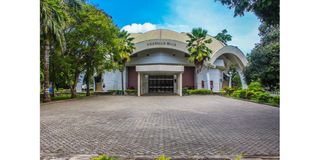Africa’s top minds meet in Dar es Salaam to rescue higher education freedoms

What you need to know:
- The four-day Conference on Academic Freedom in Africa, organised by the College of Social Sciences at the University of Dar es Salaam (UDSM) in collaboration with the Council for the Development of Social Science Research in Africa (CODESRIA), runs from April 29 to May 2, 2025
Dar es Salaam. A major continental conference opens today, April 29, 2025 in Dar es Salaam, bringing together over 200 participants from across Africa to deliberate on the growing threats to academic freedom and the autonomy of institutions of higher learning.
The four-day Conference on Academic Freedom in Africa, organised by the College of Social Sciences at the University of Dar es Salaam (UDSM) in collaboration with the Council for the Development of Social Science Research in Africa (CODESRIA), runs from April 29 to May 2, 2025.
The event, held at UDSM, convenes leading scholars, researchers, students, policymakers, diplomats, and representatives from regional and international organisations.
The meeting seeks to revisit and update the Kampala Declaration on Intellectual Freedom and Social Responsibility, adopted in 1990, reflecting on its contemporary relevance and how it may be strengthened to meet current challenges.
The conference takes place at a time when freedom within universities across Africa is shrinking, threatening the role of academics and scholars in shaping societies.
Speaking during a press briefing on April 28, 2025, Dr Ng’wanza Kamata, a Senior Lecturer in the Department of Political Science and Public Administration at UDSM, described the situation as alarming.
"We are witnessing growing trends of threats, suppression, and shrinking space for academic freedom in Africa," Dr Kamata said.
"Universities, once strongholds of free thought, are facing increasing restrictions from political and economic pressures."
He noted that more than three decades after the adoption of the Kampala Declaration and the Dar es Salaam Declaration on Academic Freedom, conditions had deteriorated rather than improved.
"Despite the strong frameworks set by these declarations to protect and promote academic freedom, the environment in many African universities has worsened," he said.
According to scholars, the situation deteriorated following the adoption of Structural Adjustment Programmes (SAPs) in the 1980s and 1990s, which weakened higher education institutions across the continent.
These policies, promoted by the World Bank and the International Monetary Fund (IMF), led to severe funding cuts and rendered universities more vulnerable to state control.
In the face of new political and technological realities, Dr Kamata underscored the urgent need to renew the commitment to academic freedom.
"This conference is important because it will assess whether the Kampala Declaration still responds to today’s needs or whether it should be updated to defend scholars better," he said.
The conference will be officially opened by the Speaker of the National Assembly of Tanzania and President of the Inter-Parliamentary Union (IPU), Dr Tulia Ackson.
A Senegalese sociologist and one of Africa’s leading voices on academic freedom, Dr Fatou Sow, said revisiting the Kampala Declaration was long overdue.
"The world has changed. Technology, authoritarianism, and even global university rankings have brought new challenges to intellectual freedom," she said.
"We need an updated document that speaks to these issues."
The Kampala Declaration remains one of Africa’s key guiding frameworks, affirming the inalienable rights of scholars to intellectual freedom, institutional autonomy, and social responsibility.
Articles within the declaration emphasise that governments should protect academic institutions from state interference, refrain from censorship, and promote the free movement of scholars across borders.
Yet, three decades later, African scholars continue to face arrests, censorship, surveillance, and political pressure when they express critical views.
A renowned Ugandan academic, Prof Mahmood Mamdani, said academic freedom was central not only to universities but to democracy itself.
"When scholars cannot speak freely, societies suffer. Critical thinking, innovation, and social change become impossible," Prof Mamdani said.
"This conference is a crucial moment for Africa to defend the intellectual spaces that are vital for progress."
Throughout the four days, participants will deliver more than 60 papers across nine plenary sessions and 18 parallel panels.
Discussions will cover topics such as governance, funding crises, gender and race in academia, student activism, publishing dilemmas, mental health challenges, and technological shifts affecting academic work.
One of the major highlights of the conference will be the launch of the 50th Anniversary Edition of Class Struggles in Tanzania by Prof Emeritus Issa Shivji, a towering figure in African liberation thought.
The conference also aims to produce an Addendum to the Kampala Declaration, capturing today’s complexities and offering a renewed vision for academic freedom.
As Dr Kamata put it, "This is about securing the future. Without academic freedom, Africa cannot achieve the political, social, and economic changes that benefit the majority."





